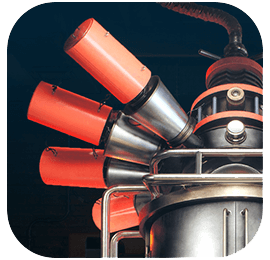UNIGINE Community SDK is now free to all the technical enthusiasts worldwide. There are only a few real-time 3D engines on the mass market, and now here comes another big one. Previously our platform was available only to the large companies (making professional 3D simulators, digital twins, and so on), so the free SDK edition is a big deal.
The UNIGINE 2 Community SDK makes the same 3D rendering technology used by leading enterprises available to a global community of programmers and digital artists. Individual developers or projects with annual revenue or funding not higher than 100,000 USD, and non-profit organizations can leverage from the main features of the engine, including photorealistic visual quality, VR optimizations, both C++ and C# APIs, a library of ready-to-use high-level objects, and a visual scene editor. This will enable the creation of various applications with 3D graphics: games, animation, architecture visualization, VR apps, product visualization, interactive art, and much more.
The enterprise-grade features, like large world support with virtual scenes as expansive as the solar system, distributed simulation over a network, embedding into proprietary apps, an extended set of GIS/CAD data formats, advanced video output, professional motion capture, and many others are available in the commercial SDK editions---UNIGINE 2 Engineering and UNIGINE 2 Sim.
What's New
UNIGINE 2.19.1: Upscalers in VR, USD Import, Animation Preview, Stabilization
Key Changes
- Import from USD data format
- Upscalers (DLSS and FSR) support in VR
- Animation preview in the Editor
- OpenXR handtracking and Linux support
- WebStreaming plugin improvements
- Performance optimizations: faster hashmaps
- ImGUI Integration and sample plugin for UnigineEditor
- New SpiderVision samples
- Account registration in SDK Browser
- Unigine Learning Course in C++
This release primarily focuses on stabilization, while also introducing several significant new features.
SSRTGI Improvements
We are continually enhancing our Screen-Space Ray-Traced Global Illumination (SSRTGI) technology to achieve even greater photorealism. The ray distribution across the hemisphere has been completely redesigned to improve the overall effect. Updates have also been made to the accumulation and application process for SSGI. Gamma correction issues have been resolved for SSAO, both when writing to the buffer and during rendering debug visualization.
Upscalers in VR
Upscalers such as NVIDIA DLSS 3 (Deep Learning Super Sampling) and AMD FSR 2.2 (FidelityFX Super Resolution), introduced in version 2.18.1, are essential for reducing pixel load at higher resolutions, freeing up resources, and ensuring optimal performance. With this release, these upscalers are now available in VR as well, delivering a significant performance boost in virtual reality environments.
SpiderVision Plugin Updates
The SpiderVision plugin has been enhanced with undo/redo functionality, improved multiselection in Projection Setup widgets, main window designation, UI tooltips, and a new Borderless window type in the API.
Web Streaming Improvements
In version 2.19, we introduced the WebStream plugin, allowing you to broadcast audio and video frames rendered by a UNIGINE application via WebRTC. This release builds on that by enabling streaming from any existing camera to a separate web browser instance. This feature allows you to switch between cameras in the scene, provide different views to various client devices (including mobile), and display multiple views in separate browser instances on a single device. Additionally, the update includes optimizations and performance improvements.
USD Import and Export
Building on the USD (Universal Scene Description) export functionality introduced in 2.19, this release adds support for USD import, enabling the use of usda, usdc, and usdz files.
Additionally, the USD Export plugin in UnigineEditor has been renamed to USD Exchanger and is now available across all SDK editions, including the free Community edition.
Animation Preview
As part of our ongoing improvements to the virtual avatar animation system, animation preview is now built into the Editor, enabling you to easily view and select animations directly in the Asset Browser without needing to assign them to a Skinned Mesh object.
ImGui Integration
Dear ImGui is a bloat-free graphical user interface library for C++ enabling fast iterations and empowering programmers to develop content creation tools and visualization / debug tools quickly and efficiently. It has been used by a number of our customers, and there have been plenty of questions asked and answers provided. So, for this release we decided to implement and deliver an integration sample showcasing the most commonly used and frequently asked things regarding Editor plugins based on Dear ImGui.
This sample is available on the Add-On Store as ImGuiSamplesPlugin and covers multiple basic cases encountered by users when making their own Editor plugins.
The plugin adds a dedicated window in UnigineEditor with three tabs, each showcasing a unique sample:
- Spline Editor: Demonstrates using the Undo/Redo system via API, remappable hotkeys, and custom visualization with spline editing as an example.
- Editor (Immediate Mode): Showcases working with Editor and Engine widgets in immediate mode (similar to ImGui), ideal for prototyping or simple plugins. Features interactive polygon manipulation with live updates.
- Components: Highlights in-Editor generation and assignment of C++ components to nodes, enabling real-time execution and parameter adjustments directly in the Editor.
Other Changes
- OpenXR hand tracking and Linux support
- Various quality-of-life improvements for the Editor
- Performance optimizations, including faster hashmaps
- GUI render optimizations made it approximately 2 times faster
- Added force feedback support for steering wheel controllers
- Numerous bug fixes
- New user account registration directly from the SDK browser
- Free UNIGINE learning course for C++ developers
- New sample: physics-based robot arm with a kinematic chain

